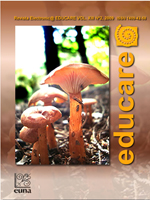Validación del software educativo Poliestudio 1.0: informe de investigación
DOI:
https://doi.org/10.15359/ree.13-2.3Keywords:
software validation, computational tool, teaching, polynomial expressionsAbstract
PoliEstudio 1.0 is a computational tool, with free license, created to work with polynomial expressions in one variable and it was created by a team in which the authors of this article are part of. This article documents the qualitative validation performed to this software which main objective was to bring to the Costa Rican Educational System a validated educational software that can solve, partially, the problems that nowadays exists in the mathematic education of secondary students, particularly in the topics related to polynomial expressions in one variable and specifically to those students who are in eighth grade.
References
Bermejo, J. (2007). Estudio de Caso. Recuperado el 15 de marzo de 2007, de http://www2.uiah.fi/
projects/metodi/271.htm
Bunge, M. & Sacristán, M. (2000). La investigación científica: su estrategia y su filosofía. Madrid,
España: Siglo XXI.
Cataldi, Z., Lage, F., Pessacq, R. & García, R. (1999). Ingeniería de software educativo. Recuperado
el 8 de octubre de 2007, de
http://www.fi.uba.ar/laboratorios/lsi/c-icie99-ingenieriasoftwareeducativo.pdf
Cataldi, Z. (2000). Metodología de diseño, desarrollo y evaluación de software educativo. Tesis de
Maestría, Facultad de Informática, Universidad Nacional de la Plata, Argentina.
Chavarría, J. & Fallas, J. (2008). Validación del software educativo PoliEstudio 1.0. Tesis de
Licenciatura, Escuela de Matemáticas, Universidad Nacional, Costa Rica.
Colás, M. P. & Buendía, L. (1998). Investigación educativa. Sevilla, España: Alfar.
González R., B. (2002). Criterios y métodos de evaluación de software educativo. Recuperado el 29
de setiembre de 2007, de http://byrong.iespana.es/public/evsoftwared.pdf
Marqués, P. (1996). El software educativo. Universidad Autónoma de Barcelona. Recuperado el 5 de
setiembre de 2007, de http://www.lmi.ub.es/te/any96/marques_software/#index
Marqués, P. (1998). Programas didácticos: diseño y evaluación. Recuperado el 15 de setiembre de
, de http://www.karisma.org.co
Taylor, S. y Bogdan, R. (1996). Introducción a los métodos cualitativos de investigación: La búsqueda
de significados. (3ª Reimpr.). Madrid, España: Paidós.
Downloads
Published
How to Cite
Issue
Section
License
1. In case the submitted paper is accepted for publication, the author(s) FREELY, COSTLESS, EXCLUSIVELY AND FOR AN INDEFINITE TERM transfer copyrights and patrimonial rights to Universidad Nacional (UNA, Costa Rica). For more details check the Originality Statement and Copyright Transfer Agreement
2. REUTILIZATION RIGHTS: UNA authorizes authors to use, for any purpose (among them selfarchiving or autoarchiving) and to publish in the Internet in any electronic site, the paper´'s final version, both approved and published (post print), as long as it is done with a non commercial purpose, does not generate derivates without previous consentment and recognizes both publisher's name and authorship.
3. The submission and possible publication of the paper in the Educare Electronic Journal is ruled by the Journal’s editorial policies, the institutional rules of Universidad Nacional and the laws of the Republic of Costa Rica. Additionally, any possible difference of opinion or future dispute shall be settled in accordance with the mechanisms of Alternative Dispute Resolution and the Costa Rican Jurisdiction.
4. In all cases, it is understood that the opinions issued are those of the authors and do not necessarily reflect the position and opinion of Educare, CIDE or Universidad Nacional, Costa Rica. It is also understood that, in the exercise of academic freedom, the authors have carried out a rogorous scientific-academic process of research, reflection and argumentation thar lays within the thematic scope of interest of the Journal.
5. The papers published by Educare Electronic Journal use a Creative Commons License:















 The articles published by Educare Electronic Journal can be shared with a Creative Commons License:
The articles published by Educare Electronic Journal can be shared with a Creative Commons License: 



